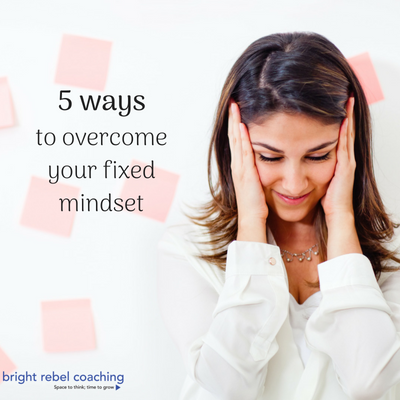The last couple of weeks, I’ve been talking about mindset and why a growth mindset is instrumental to learning and developing. But all of us have a fixed mindset in at least one area of our life, where we tell each other that we just can’t do something. (I can’t dance; I can’t parallel park; I can’t cook, etc). That’s probably not going to impact on your life too much if you don’t like to dance, you rarely drive or you’re happy to live on ready meals. But a fixed mindset that is easily accessible might also indicate a fixed mindset on something much more important to us that is less easy to see. For example, you may have a belief, somewhere deep inside, that you are unlovable. Despite being an adult who outwardly looks like you have high self-esteem, there might be this little nugget of feeling like you are not worthy. Every time something happens like a friend letting you down, family getting annoyed at you or an argument about where you spend Christmas, that little voice pipes up saying ‘there you go, that’s proof that nobody loves you’. That voice looks for evidence that its true and will overlook all of the evidence that it is not. We listen to that voice and choose to believe it. That belief impacts how we live our life. In this unlovable example, it could cause us to not seek out relationships, it can allow us to accept people behaving in unfair and abusive ways towards us or it can make us lash out because we’re desperate for someone to prove that that voice isn’t true and we can be loved even if we are behaving badly. That inner voice is instilled in childhood and validated in adulthood so we cannot expect it to behave rationally and although it is trying to protect us from hurt, it is rarely kind.
1. The first thing to do is acknowledge when that voice is talking to us. You will notice that our inner critic is not spectacularly original. It will throw up the same thought again and again. Notice those thoughts.
2. Acknowledge that you have a choice. You can listen to that voice, you can ignore it or you can talk back to it.
3. How do you talk back? Talk back in a growth mindset voice. I’m not suggesting that you turn a thought like ‘you are unlovable’ into ‘everyone in the world adores you’. You’re not going to believe that. But what is a neutral or more positive thought that is helpful to you? How about ‘some people love me’ or ‘I am worthy of love’ or ‘Lots of people care about me even if they are sometimes selfish or unfair.’
4. Use the word ‘yet’. If your voice says ‘I can’t dance’, add a ‘yet’ on to it. If it’s something you want to do, accept that you can make yourself better at it with effort. You are not going to learn to dance, parallel park or cook without doing something about it.
5. Accept failures are stepping stones to your success. Nobody in the whole world has ever learnt anything worthwhile without making a hash of it first. Your granny’s amazing apple pie? She’s made that without sugar once or twice or had her world-famous Victoria sponge not rise. (Usually when the butter is too hard. Butter and eggs are definitely the key….) Each time you try, you progress. Remember, on this path no effort is wasted!
Originally published at www.brightrebel.co.uk


